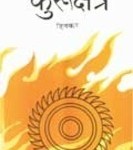 Kurukshetra is a poetic description of the analysis and after effects of a war. The poet has taken the Bhishma – Yudhishthir dialogue after the Mahabharat war was over in order to explain the effects of war.
Kurukshetra is a poetic description of the analysis and after effects of a war. The poet has taken the Bhishma – Yudhishthir dialogue after the Mahabharat war was over in order to explain the effects of war.
After the war was over, Yudhishthir repents on the unjust caused by war. Yudhistir says that everybody understands the effects of war. The end result of every war is only destruction, but is it just to have enormous casualties for the selfish purpose of few.
“युद्ध को पहचानते सब लोग हैं,
जानते हैं, युद्ध का परिणाम अन्तिम ध्वंस है!
सत्य ही तो, कोटि का वध पाँच के सुख के लिए!”
Bhishm replies that nobody wants to get sick, but when the infection has already spread then their is no alternative other than treating it from root. He then explains that by itself no action is just or unjust. It is the internal feeling which makes it so.
“रुग्ण होना चाहता कोई नहीं,
रोग लेकिन आ गया जब पास हो,
तिक्त ओषधि के सिवा उपचार क्या?
शमित होगा वह नहीं मिष्टान्न से।है मृषा तेरे हृदय की जल्पना,
युद्ध करना पुण्य या दुष्पाप है;
क्योंकि कोई कर्म है ऐसा नहीं,
जो स्वयं ही पुण्य हो या पाप हो।
Bhishm further explains that Lord Krishna explained it very well that the feelings of the actor are more important than the action itself. And it is important for one to separate oneself from the “Karma” and still continue doing that. He explains to Yudhishthir that although the prime duty of a human being is mercy and compassion. but when the interest of the larger society is concerned we have to forget that prime duty. He then says that pardoning only suits the powerful people.
सत्य ही भगवान ने उस दिन कहा,
‘मुख्य है कर्त्ता-हृदय की भावना,
मुख्य है यह भाव, जीवन-युद्ध में
भिन्न हम कितना रहे निज कर्म से।'”“व्यक्ति का है धर्म तप, करुणा, क्षमा,
व्यक्ति की शोभा विनय भी, त्याग भी,
किन्तु, उठता प्रश्न जब समुदाय का,
भूलना पड़ता हमें तप-त्याग को।जो अखिल कल्याणमय है व्यक्ति तेरे प्राण में,
कौरवों के नाश पर है रो रहा केवल वही।
किन्तु, उसके पास ही समुदायगत जो भाव हैं,
पूछ उनसे, क्या महाभारत नहीं अनिवार्य था?”“क्षमा शोभती उस भुजंग को,
जिसके पास गरल हो।
उसको क्या, जो दन्तहीन,
विषरहित, विनीत, सरल हो ?
Finally he explained the episode from Ramayan as mentioned below –
तीन दिवस तक पन्थ माँगते
रघुपति सिन्धु-किनारे,
बैठे पढते रहे छन्द
अनुनय के प्यारे-प्यारे।उत्तर में जब एक नाद भी
उठा नहीं सागर से,
उठी अधीर धधक पौरुष की
आग राम के शर से।सिन्धु देह धर ‘त्राहि-त्राहि’
करता आ गिरा शरण में,
चरण पूज, दासता ग्रहण की,
बँधा मूढ बन्धन में।”
About the Author
Ramdhari Singh ‘Dinkar’ was an Indian Hindi poet, essayist, patriot and academic. He is famous for his nationalist poetry written in the days before Indian independence. He was born on 23rd September 1908 and passed away on 24th April 1974)
